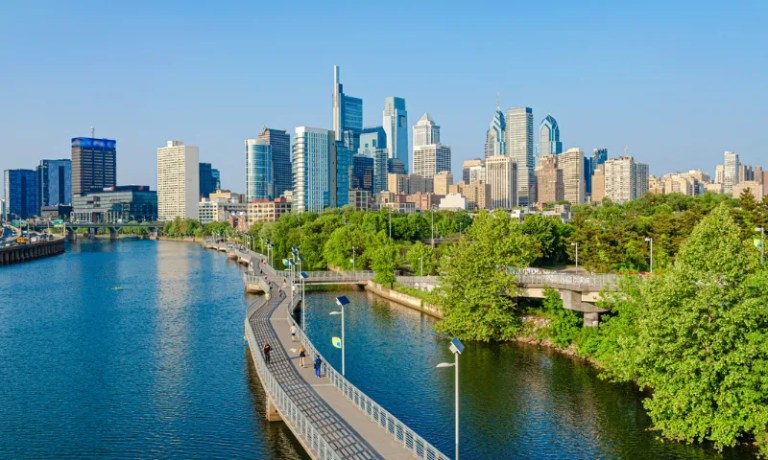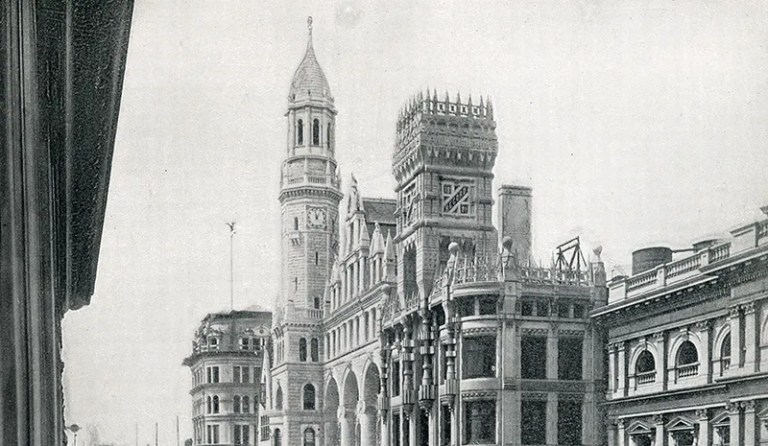The real cost of bottled water.
See how our bottleless water coolers compare.
Areas served
Offer a more sustainable solution for cleaner, better-tasting water on demand.
Fast, efficient, and reliable ice and water machines with advanced filtration.
Bottomless bubbles with built-in filtration for your modern workplace.
Better water makes better coffee. Give your people great-tasting coffee from best-in-class brewers.


Today, Philadelphia has three water treatment plants to remove harmful chemicals, wastes, and pathogens which can contaminate river water. The city still adds chlorine and other chemicals to protect Philadelphia tap water from bacteria and other organisms, although ammonia reduces the chlorine taste and odor.
The Schuylkill and Delaware Rivers continue to supply approximately 230 million gallons of groundwater daily, and the Schuylkill River in particular has become a National Heritage Area and a scenic river walk. Like many older cities, most of Philadelphia’s water mains and infrastructure consist of cast iron pipes, the industry standard until the mid-1960s. The average age of a Philadelphia water line is about 80 years old, with some pipes dating back to the early 1800s. Older cast iron pipes are prone to corrosion and biofilm contamination from chemical reactions, which create clusters of corrosion and bacteria along the inside of the pipe. Sometimes these clusters break off and travel with your water to your faucet, resulting in cloudiness, red water, and off-taste and odor.
The Philadelphia corrosion control monitoring program has sought to minimize contamination caused by indoor pipes by installing a coating that protects lead from leaching into the water. Programs introduced in 2016 have further helped residents replace lead service lines, and water treatment plants add Zinc Orthophosphate to minimize pipe corrosion. The enforcement of stricter drinking water standards has successfully reduced water turbidity to meet regulatory requirements. However, a recent study by The Environmental Working Group found that Philadelphia tap water ranks among the most contaminated of any major US metropolitan area.
The City of Brotherly Love sits in the crux of two mighty rivers, the Schuylkill and Delaware. Even with fresh water on both sides of the city, colonial Philadelphia was fraught with frequent and widespread epidemics. In the 1700s, Philadelphians often dumped industrial waste and human sewage into the creeks and streams, and disease-causing contaminants decreased the Philadelphia water quality.
An increase in water pollution drove the city to innovate and build one of the country’s first water and wastewater systems. Surface creeks and streams provided the framework for this infrastructure to improve Philadelphia water quality. Sewers in creek beds cost-effectively used gravity flow to move the wastewater away from the city, allowing city planners to create a grid layout.
Unfortunately, the systematic erasing of surface creeks and streams impacted the natural waterflow. Of the 283 miles of streams that once carried runoff to the Schuylkill and Delaware Rivers, only 118 miles remained. It wasn’t until the early 20th Century that city planners realized the negative effects of piping streams. In 1815, they combined the beauty of nature and the science of engineering to create the awe-inspiring Fairmount Water Works, praised for its pleasant Neoclassical exterior and cutting-edge water supply system. (Check out the video below to learn more about Fairmount Water Works.)
To further improve Philadelphia water quality and curb sewage pollution, lawmakers passed the Purity of Water Act in 1905. Although not enforced until the 1950s, the act combatted sewage-filled intake sources by adding chlorine to filtered water. Philadelphia drinking water earned the nickname “Schuylkill Punch” for its chlorinous smell and earthy, musty scent from algae growth.
See how our bottleless water coolers compare.
Talk to an Philadelphia Culligan Quench water expert to find the best water solution for your space.
Backed by 85 years of Culligan expertise, Culligan Quench has focused exclusively on providing businesses with the highest quality filtered water. This commitment to doing one thing well has made us the trusted water authority for over 75% of the Fortune 500. We offer the best bottleless water coolers, ice machines, sparkling water dispensers, and coffee brewers to fit any workplace. No matter your location, company size, or industry, we have a filtered water solution that is right for you
Play videoProudly providing businesses with clean, filtered drinking water in the greater Philadelphia Metro Area.
| Mon: | 8 AM – 8PM |
| Tues: | 8 AM – 8PM |
| Wed: | 8 AM – 8PM |
| Thur: | 8 AM – 8PM |
| Fri: | 8 AM – 8PM |
| Sat: | Closed |
| Sun: | Closed |
Your local Culligan Quench team in Philadelphia knows the area’s unique water quality. Schedule a quick call with one of our water experts, and we’ll connect you with personalized service tailored specifically to your zip code.
Manager, Sales (Northeast)
Vice President, Service (East)
Vice President, Operations
Senior Vice President, Care and Field Service
Yes, Philadelphia tap water is safe to drink and is regularly tested to meet or exceed U.S. Environmental Protection Agency (EPA) standards. The water is sourced primarily from the Schuylkill and Delaware Rivers and treated at two large water filtration plants. The Philadelphia Water Department (PWD) conducts over 200,000 water tests per year to ensure that contaminants are within safe limits.
For businesses, especially those in food service, hospitality, or healthcare, it’s important to ensure that internal plumbing systems—particularly in older buildings—do not introduce contaminants like lead. Many businesses opt for point-of-use filtration systems or offer bottleless water dispensers to improve the taste and ensure water quality.
Regular water testing and installing a filtration system can boost employee satisfaction and wellness while providing high-quality water for your customers.
Yes, Philadelphia has moderately hard water, with an average hardness of around 150–200 parts per million (ppm) of calcium and magnesium. This means businesses in the area may experience scale buildup in pipes, water heaters, and appliances like dishwashers and coffee machines.
Impact on businesses:
Installing a water softening system or descaling treatments can reduce mineral buildup, extend appliance lifespan, and improve overall operational efficiency in water-using appliances.
While Philadelphia’s tap water meets federal safety standards, like many major cities, the city does face occasional water quality concerns, often related to older plumbing systems and the potential for lead contamination. The Philadelphia Water Department (PWD) continues to work on upgrading the city’s infrastructure, particularly in neighborhoods with lead service lines.
For businesses, it’s important to monitor and address lead risks in buildings with older pipes or fixtures. In such cases, water filtration systems or point-of-use filters can ensure the safety of drinking water for employees and customers.
Additionally, businesses should stay informed about any water advisories or infrastructure projects that could affect water quality. The PWD offers resources and alerts to help businesses stay updated on any issues that may arise, such as water main breaks or service interruptions.
If your business is located in an older building or historic district, test your water regularly and consider installing certified filters to reduce potential lead exposure.
Over 120,000 companies, big and small, trust Culligan Quench for cleaner, safer, and great-tasting water.
Ready to upgrade
your water?Get matched with the best water, ice, sparkling water or coffee machine for your workplace.
Take our quiz